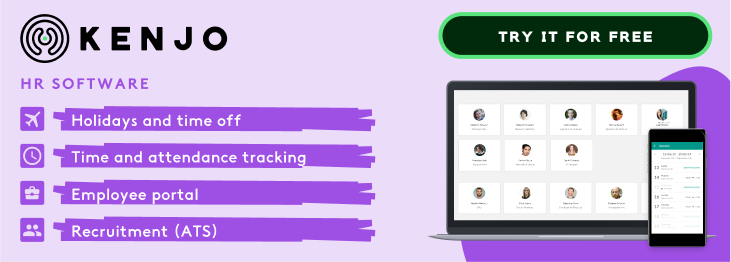Outsourcing HR: the pros and cons

Many companies see HR outsourcing as a great way to save resources (ultimately, time and money) and make use of specialist expertise and experience.
In this article, we will take a close look at the benefits this model offers, and review some of the negative aspects. We will also see which services are most often subcontracted and some tips for successfully navigating the process.
What is HR outsourcing?
Outsourcing is another word for subcontracting, which involves hiring a third-party service to carry out certain responsibilities or duties on behalf of a department.
The tasks that are subcontracted usually depend on each company’s needs and interests; however, it’s common for organisations to delegate less strategic duties, or those that are highly manual, specialised, or unprofitable.
In terms of HR, the most frequently outsourced services are:
- Recruitment, training, and development.
- Monitoring the organisational structure.
- Tracking department objectives, targets, and strategies.
- Employee inductions.
- Payroll management.
Why is HR outsourcing important?
Outsourcing aims to achieve the multiplier-effect; in other words, to generate better results from the same investment. And the statistics show it works. A report by the Hackett Group reveals that companies that subcontract these services spend 26% less and have 32% less staff. The remaining internal employees are dedicated to strategic planning, while talent acquisition, onboarding, etc, are delegated to others.
And this is not the only reason why outsourcing is important. We can also mention:
- The saving from outsourcing HR services lies between 24% and 32% (Corban One).
- 72% of companies highlight the ability to concentrate on other tasks as the main benefit of outsourcing the service. (Deloitte).
- Only 19% of respondents report having issues or difficulties with their provider. And, of these, 46% say this is due to receiving a more reactive than proactive service.
- Since the Great Recession, 57% of US companies increased the use of outsourcing. Meanwhile, only 9% terminated outsourcing agreements, showing most companies found it to be a very cost-effective solution (Brandon Gaille).
The advantages of HR outsourcing
Some of the benefits of outsourcing HR functions are clear, such as cost savings or increased efficiency; however, there are other key advantages that are sometimes overlooked.
- Cost savings: you need a big pot of cash to be able to fund a human resources department with ample staff and resources. This cost, in general, cannot be absorbed by small to medium sized businesses; as a result, many opt to subcontract these services. Using an external company is usually much cheaper and provides access to a wide range of expert professionals in different areas.
- Time savings: the human resources department’s duties involve many repetitive and manual tasks. These can consume an awful lot of time, so when a company chooses to outsource them, the internal staff can dedicate themselves to much more important matters.
- Access to specialist profiles: building an HR department with specialist roles for each area is very difficult and costly. In general, therefore, teams are composed of generalist professionals. However, by using a specialist external provider, you can work alongside the experts and obtain better results.
- Complying with legal obligations: compliance in the workplace is not easy. There are countless laws, many of which are changed or updated every year, so you’re never quite sure if you are doing the right thing. A single error can have serious consequences. An external provider can help you remain up-to-date and comply with your obligations.
- Employee benefits: Subcontracting HR can also bring benefits for your employees. Perhaps your provider will help you negotiate a better benefits package for your workforce or access health insurance at a more favourable price.
The disadvantages of outsourcing human resources
But let’s not be naïve. Of course, outsourcing HR has its downsides. The most important ones you need to know about are:
- Loss of control: for many companies, the HR department is the heart of the organisation. By delegating it to a third party you lose an element of control, which is a common concern when deciding to take this path. However, if you can find a partner that shares your vision it is much easier to keep your goals aligned.
- Culture changes: the company culture is what makes employees want to work there. When someone else manages this area, it can lose something of the tone you have created and shift the dynamics.
- Less flexibility: an external company is likely to take longer to reply than an internal team would. In this case, it is important to agree standard response times to avoid problems.
- Contrasting visions: the HR manager will usually have set ideas about how things should be done within the department. It is important to align these perspectives with the provider to ensure expectations are met.
Frequently outsourced services
According to one study, 79% of companies have already subcontracted one or several HR functions, which shows just how popular it has become and explains the rapid growth of the service. It also found that, in general, companies prefer not to delegate strategic or basic functions. With that in mind, here are ten HR functions that are widely outsourced:
- Compensation surveys.
- Salary administration.
- Psychometric tests.
- Attitude surveys.
- Employee training.
- Performance assessments.
- E-learning.
- Evaluation of training effectiveness.
- 360° appraisals.
- Human resources accounting.
If we dig a little deeper, The Balance Careers suggests the following services are the most popular to outsource:
- Recruitment (especially for high-volume recruiting).
- Temporary staffing.
- Background checks.
- Relocation.
- Payroll.
- Benefits administration.
- Updating employee handbooks.
- Compensation programs.
On the other hand, the following initiatives tend to remain the responsibility of the in-house department.
- Employee relations.
- Compensation program design.
- Talent development.
- Capital strategy planning.
- HR strategy.
- Performance management.
- Recruiting.
- HR department management.
What does HR outsourcing cost?
The cost of outsourcing HR functions varies, for the most part, on the number of services contracted. In general, it is often more cost-effective to sign up to a package deal from the provider.
We’ve listed some services here together with their approximate cost (according to Complete Payroll Solutions):
- Recruitment: finding and hiring the right candidate takes time. The service normally includes the stages from writing the job description to screening CVs. For this, the provider will usually charge a fixed fee based on the salary of the position you are trying to fill. Usually, this is 40% of the annual salary. However, each company offers their own rates which can vary widely.
- Compensation strategy: a well-structured and market-driven salary strategy is essential. Outsourcing this service can result in better outcomes. In general, experts charge between £75 and £110 per hour.
- Compliance assessment: an external assessor can help companies comply with the obligations and legal requirements expected of them. The cost depends on the specific tasks delegated but is usually between £725 and £1500 per month.
These figures give you a general idea of how much it costs to outsource some services. However, the best option is to consult a few providers and request a personalised quote tailored to your requirements and the size of your organisation.
5 tips to make your HR outsourcing a success
HR outsourcing can be a fundamental to many companies’ business models; however, to make it work for you, there are a number of recommendations you need to follow:
1. Read reviews from other clients
Check what other clients have said on the company’s website, social media, Google forums, etc. It is essential to investigate a little before starting to work with any service provider.
2. Think about the level of support required
The partner you choose will depend, largely, on the amount of support your company needs. So, decide which tasks you are going to delegate. These might be admin tasks, IT services (such as the employee support platform), recruitment, etc.
3. Compare the costs
First, carry out an internal analysis into what it would cost to maintain the service in-house, and find out how much it will be to outsource. This will tell you if the investment is worth it or not.
If you find the best option for your company is to use an external provider, contact a few and compare their quotes, as well as the service level they offer.
4. Ensure a smooth handover
For an HR service provider to do their work well, you need to manage the handover of responsibilities effectively. Make sure you provide all the information required and set aside time to explain how the organisation and processes work, etc. You should also emphasise the objectives and expectations.
5. Communicate internally
The presence of external HR providers doesn’t need to be a secret within the organisation. Inform all your teams about the change and, if relevant, how it may affect them on a day-to-day basis. Knowing who to ask when needed is important.

